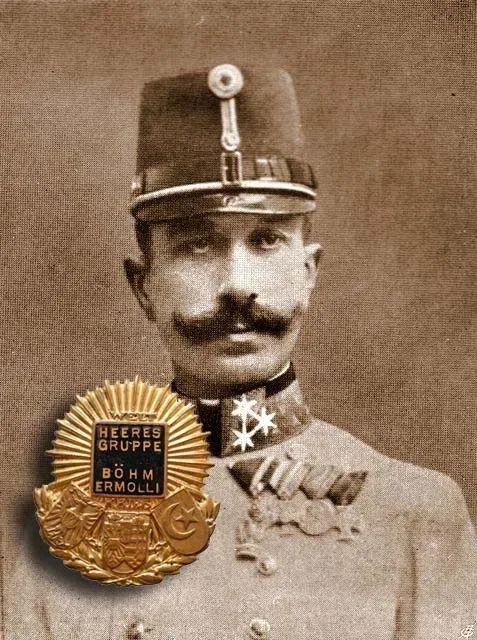Eduard von Böhm-Ermolli
Born in 1856, a military officer of Sudeten German descent, Imperial and Royal Lieutenant General, Commander of the 2nd Army. His father, Sergeant Georg Böhm, was given the rank of officer for his courage in the Battle of Novara in 1849. From 1884, the head of the family also bore the wife’s name (Böhm-Ermolli). They lived in Troppau, Sudetenland.
After training in Sankt Pölten and Vienna, Eduard Böhm-Ermolli became a lieutenant in 1875 and an officer in the 4th Dragoon Regiment. He received further training at the Military Academy in Vienna, then from 1880 he was appointed staff officer and moved to Lemberg. He then served as chief of staff of several Galician troop commands. In 1897 he was promoted to colonel, and he became commander of the 3rd Ulan Regiment. In 1901 he became a brigade commander, from 1903 a major general, from 1907 a lieutenant general and the commander of the 7th Cavalry Division. From 1911 he led the 1st Corps in Krakow.

At the outbreak of World War II, then cavalry general Böhm-Ermolli was appointed commander-in-chief of the Austro-Hungarian 2nd Army. The 2nd Army entered the Russian front after mobilization against Serbia. This hasty lineup and the need for defense against Russian attack disrupted the planned composition of the army. In the winter of 1914/15, Böhm-Ermolli played a prominent role in the organization of the 2nd Army and the construction of the Carpathian line of defense. He later remained the commander of this army. From September 1915, the Böhm-Ermolli Army Group was formed by merging additional armies in addition to the 2nd Army. The army group stationed on the Brody-Zloczów-Strypa-Buczacz line, sometimes under German upper command.

From May 1916 he was promoted to colonel general. The army group, which included the German Southern Army in the summer of 1916 in addition to the 2nd Army, was almost the only one able to hold positions during the Brusilov offensive in June 1916 in eastern Galicia. His army group also defended successfully during the 1917 Kerensky offensive and participated in the recapture of Bukovina and Czernowitz.

He received the commander’s cross of the Military Mary Theresia Order, the Grand Cross of the Hungarian Order of St. Stephen and the military Medal of Merit with oak leaves. On January 31, 1918, he was promoted to field marshal. With his army group, he was responsible for the occupation of Ukraine this year. Due to disagreements with the Germans, he was replaced in May, his army group was disbanded in Odessa, and he himself was sent to retirement.

After the war he became a citizen of the newly created Czechoslovakia. He received a pension as a reserve general in that country’s armed forces, but did not perform active service. He died on December 9, 1941. His grave is located in the cemetery in Troppau (Opava).




